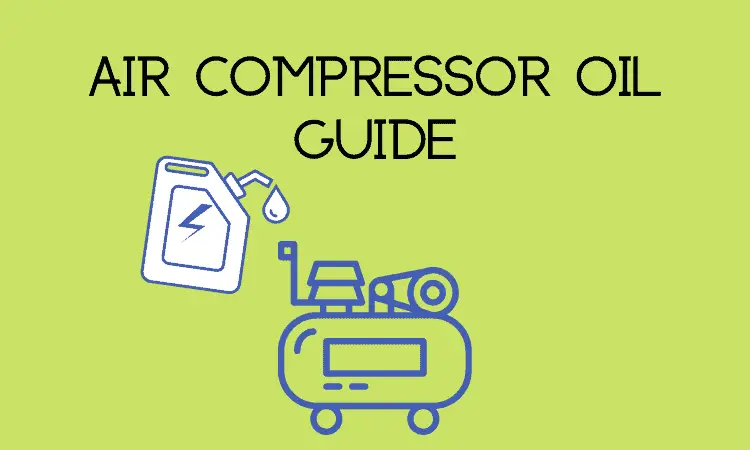There are several advantages to owning an oil-lubricated air compressor – they’re powerful, relatively quiet, and they can last decades if they’re well taken care of. But therein lies the rub. They do require a fair amount of maintenance, namely in terms of changing and monitoring the air compressor oil. And if you aren’t in the loop on a few key aspects of proper care and what kind of air compressor oil to use, you could end up damaging your air compressors.
So in this article, I’ll give you all you need to know about air compressor oil to keep your oil compressor humming for years to come.
Table of Contents
- What Does Air Compressor Oil Actually Do?
- Types of Air Compressor Oil
- Which Air Compressor Oil Types Should I Use?
- What’s Special About Air Compressor Oil?
- Air Compressor Oil Substitutes
- How Much Compressor Oil Does an Air Compressor Need?
- What Happens If You Overfill Your Air Compressor’s Oil?
- How Often Should You Change Your Air Compressor’s Oil?
- Best Air Compressor Oils
- Oil Compressor FAQ’s
What Does Air Compressor Oil Actually Do?
Air compressor oil primarily serves to lubricate the pump components and keep the pump cool, mitigating wear and tear and preventing overheating. It also acts as a seal to ensure the pump operates more efficiently. Many compressor oils also contain additives to prevent oxidation, rust, and emulsion.
Air compressor oil typically only comes into contact with the crankshaft, piston arm, and cylinder walls inside the pump, minimizing friction and carrying off heat during operation. It also helps remove carbon deposits or other grit from these components. In an oil-free compressor, these mechanical components are coated in Teflon or a similar friction-reducing material.
Types of Air Compressor Oil
There are two main categories of air compressor oil available – standard and synthetic oil.
Standard Compressor Oil
Standard air compressor oil is made from a mineral oil base, which is why it’s often referred to simply as mineral oil. This is typically the least expensive of the two categories, but it also doesn’t tend to last as long as synthetic oil.
Without going into the chemistry too much, suffice to say that standard oil breaks down faster and more easily converts to vapor. For one thing, this means that you’ll need to top off and replace the oil (and oil filter, if applicable) more frequently. Secondly, with more oil vapor getting past the seals and into the air chamber – an unavoidable occurrence in oil-lubricated pumps – you’ll have to replace the air/oil separator filter more often.
Synthetic Oil
As the name suggests, synthetic oil is made with a synthetic base – typically an artificially created proprietary blend of some kind rather than the largely petroleum-derived base used in standard oils.
Synthetic oil is more expensive than standard oil but it also lasts longer – as much as 50% longer, in some cases. It is more stable, doesn’t break down or evaporate as easily, and provides greater cooling capabilities than mineral oil. It is also typically better at removing deposits such as carbon from the pump components.
All of this means that you won’t have to change your air compressor oil as frequently when using synthetic oil and that you have more protection from overheating when using your compressor continuously for long periods.
Viscosity/Grade
Within the categories of standard and synthetic, oils are divided in terms of their viscosity (often referred to as grade). The most common compressor oils are SAE 30 or SAE 20. The higher the number, the higher the viscosity, or the thicker the air compressor oil is. This can have an impact on the compressor’s performance. It becomes even more impactful in very cold temperatures, as oil can become “sludgy” at low temperatures, meaning a lower viscosity can be beneficial during winter.
Which Air Compressor Oil Types Should I Use?
As a rule, you should always use the type and grade of oil recommended in your air compressors user manual. But in general, standard oil is better suited to light-to-medium-duty operation while synthetic oil is ideal for heavier-duty, continuous-use applications.
Most air compressor manufacturers will state that you can use either standard or synthetic. If so, you’ll have to determine the best option based on a few factors to identify the correct oil.
First and foremost, your usage – standard oil is fine for most DIY projects and general home use, but if you plan on using your compressor for big projects and running it for long periods, synthetic is likely the better option because it doesn’t break down as quickly and offers greater protection. But synthetic is also more expensive, so be sure and take that into account.
In terms of air compressor oil grade, SAE 20 or 30 is the recommended oil viscosity for most compressors, but you may want to go with the lighter one in the colder months (if you’re working outside of a climate-controlled environment) unless your user manual says otherwise. Some companies also make all-season oils designed to perform at any temperature.
Whether you use synthetic or standard, no matter the grade, make sure you use non-detergent (ND) oil. Nearly all air compressor oils are, but it pays to verify, for reasons we’ll discuss next.
What’s Special About Air Compressor Oil?
It may seem like any kind of motor oil should be sufficient to use in an air compressor, but there’s one key thing that sets air compressor oil apart from motor oil – it contains no detergents. With an internal combustion engine, detergents are instrumental in removing deposits and grit from metal components and providing thermal stability. But in an air compressor, detergents will essentially have the opposite effect.
Most compressors use splash lubrication, which basically means that air compressor oil is constantly being scooped out of an oil reservoir below the piston and splashed on the crankshaft and cylinder walls while the pump is running. If the oil contains detergents, any grit or carbon will be suspended in the oil rather than sinking to the bottom of the reservoir, and will then be splashed on the metal components. This will cause the pump to wear out faster than normal.
Air Compressor Oil Substitutes

So we’ve learned that air compressor oil is specially formulated for use in compressors and the last few sections are all about using the right kind of oil for your machine. But if you find yourself in a bind and don’t have your usual compressor oil on hand, there are a few alternatives you can use in the meantime.
However, you use these at your own risk – they are not meant as long-term replacements but only as temporary substitutes when absolutely necessary. With long-term use, they may damage or wear out your compressor. They may also void your warranty if used at all.
Before using any of them, it’s also vital to drain your air compressor oil reservoir completely and then add oil. Mixing oils is never good, but mixing any of these substitutes would be even worse for your compressor. So if all you need is a top-off, you’re better off buying more of your usual air compressor oil.
That said, let’s look at each of these substitutes. They are:
- Motor Oil (non-detergent only)
- Hydraulic Oil
- Automatic Transmission Fluid
Motor Oil
If you have motor oil for your car or lawnmower lying around, it’s probably the best alternative for air compressor oil in a pinch. But there are a few things to keep in mind before pouring it in.
First, it must be non-detergent (ND) motor oil – as described above, detergents are death for your air compressor pump. Second, avoid using multi-grade oil (such as 10W30) in your compressor, as it tends to foam up when used in a compressor. (The only exception is if your compressor’s owner manual specifically suggests using multi-grade oils as a temporary substitute.)
In general, it’s best to use the same grade of motor oil as your compressor oil – if your compressor takes SAE 30, try to use SAE 30. Deviating from this won’t likely be a big deal, but try to stay as close as possible. It doesn’t much matter whether you use standard or synthetic oil, but synthetic is probably better since it’s less likely to break down or evaporate.
Hydraulic Oil
Hydraulic oil is used as a lubricant, cooling agent, and power transfer medium in a range of hydraulic equipment such as jacks and forklifts, but it can also be used in place of compressor oil if necessary.
It’s best to use a general-purpose or “universal” hydraulic oil, if possible – do not use hydraulic fluids designed for specific systems (such as power steering fluid), as these may damage your compressor.
Hydraulic oil grade is most often denoted by ISO rather than SAE – most commonly, ISO 32 and ISO 46. Either should work for your compressor, but 32 is probably better, particularly in cold temperatures, as it’s closer to the typical SAE 20-30 range used in most compressors.
Some hydraulic oils contain anti-wear (AW) additives to protect against oxidation, foaming, among other things. This is fine as long as it does not contain (you guessed it) detergents.
Automatic Transmission Fluid (ATF)
The last option for a compressor oil substitute is automatic transmission fluid. It has many properties that allow it to serve similar functions as oil (it is a sort of hydraulic oil, after all) – namely, lubrication and cooling for thermal stability. But due to its downsides, it should probably be your last choice.
For one thing, almost all ATFs contain detergents, your compressor’s sworn enemy. Secondly, the viscosity of most ATFs is significantly lower than that of compressor oil. The thinner fluid can negatively affect performance, fail to provide proper lubrication, and even leak past the piston rings and get into the air chamber.
While automatic transmission fluid can work in a pinch, it’s best used as a last resort.
How Much Compressor Oil Does an Air Compressor Need?
The amount of compressor oil your air compressor needs will depend on your specific model. Oil capacity for air compressors ranges from about 6 ounces to 1 gallon, depending on the size and type of compressor. If you don’t have the user manual, you can contact the manufacturer or simply check the level.
How To Check the Compressor Oil Level On an Air Compressor
You can check the oil on most air compressors in one of two ways – a sight glass or a dipstick. The sight glass is typically located below or near the compressor oil fill cap. In most cases, the nominal oil level is reached when the oil comes to the center of the sight glass. In the case of a dipstick, the desired level or range should be clearly marked.
What Happens If You Overfill Your Air Compressor’s Oil?
Nothing good happens when you overfill your air compressor’s oil reservoir. The excess compressor oil can leak into the air system during operation, contaminating your compressed air supply and causing damage to internal components. For this reason, you should always be careful not to add too much oil.
A little bit of oil vapor in the air system is unavoidable, but excess oil can foul valves, oversaturate the air/oil separator, and interfere with whatever application you’re using your compressor for. In some cases, your air hose may even “spit” oil.
If you’ve accidentally added too much oil, it likely won’t be a problem until you turn the pump on. So always be sure to check the oil level before you operate your compressor.
If it’s too high, simply open the drain plug and let some oil out until the appropriate level is reached. This can be a messy business, so it’s always better to err on the side of caution and underfill the compressor initially – it’s much easier to add a little bit more oil if need be. Of course, operating the compressor with too little oil can also damage the pump, so make sure you achieve the correct level before turning it on.
How Often Should You Change Your Air Compressor’s Oil?
You should always follow your manufacturer’s recommendation for how often to change your specific air compressor’s oil. But as a general rule, it’s best to change your oil after every 1,000 hours of service. If you use standard oil rather than synthetic, you may need to change it more often.
If counting up the service hours seems like a tedious task, you can simply change your compressor oil every year if your compressor sees light to moderate use (less than 3 days a week), or every 6 months if you use it regularly (3+ days a week).
Best Air Compressor Oils
Naturally, it’s always best to use the specific oil your manufacturer recommends. In most cases, this won’t restrict you to a particular brand – as long as you stick with the right viscosity and oil type specified in your user manual, you should be fine.
So here are a few options for compressor oil that we’ve found to be the best choices on the market.
Mobil Rarus 427
This standard/mineral oil from Mobil is a solid option for a no-frills air compressor oil. With an SAE 30 viscosity grade, it’s compatible with most reciprocating and rotary compressors.
Royal Purple Synthetic Compressor Oil
For a synthetic option, it’s hard to go wrong with this SAE 30 oil from trusted brand Royal Purple. Designed for use in reciprocating (piston) compressors, this is a long-lasting oil with excellent corrosion control.
Oil Compressor FAQ’s
What type of air compressor oil types should I use for my oil lubricated air compressor?
The type of air compressor oil you should use for your oil lubricated air compressors depends on the manufacturer’s recommendation. However, most manufacturers recommend using synthetic compressor oil or mineral oil bases for optimal performance and extended engine life.
Can I use non-detergent motor oil instead of air compressor oil for my reciprocating air compressor?
No, it is not recommended to use non-detergent motor oil instead of air compressor oil for your reciprocating air compressor. Non-detergent motor oil lacks the necessary additives for proper lubrication and can cause damage to your air compressor system.
What are oil separators in rotary screw compressors?
Oil separators are an essential component of rotary screw compressors that separate the oil from the compressed air. The oil is then sent back to the compressor’s sump, and the clean air is released into the system.
What happens if I use the wrong oil for my air compressors?
Using the wrong oil for your air compressor can cause a decrease in performance, damage to the system, and possibly a fire. Different types of air compressors require different types of oil with specific auto ignition temperatures.
Do oil less air compressors require oil?
No, oil less air compressors do not require oil since they use other methods for lubrication. However, it is essential to follow the manufacturer’s recommendations for maintenance and replacement of parts to ensure optimal performance.




